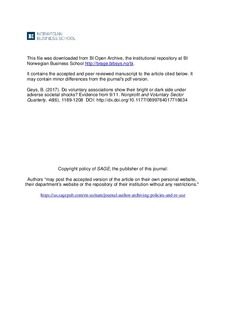Do Voluntary Associations Show their Bright or Dark Side under Adverse Societal Shocks? Evidence from 9/11
Journal article, Peer reviewed
Accepted version
Permanent lenke
http://hdl.handle.net/11250/2472540Utgivelsesdato
2017Metadata
Vis full innførselSamlinger
- Publikasjoner fra CRIStin - BI [1015]
- Scientific articles [2181]
Originalversjon
Nonprofit and Voluntary Sector Quarterly, 2017, 46(6), 1189-1208 http://dx.doi.org/10.1177/0899764017718634Sammendrag
In this article, we reassess the relation between association membership and individuals’ feelings about immigrants, thereby focusing on possible shifts in this relation in the wake of negative societal shocks (i.e., the 9/11 terrorist attacks). That is, do such events tighten or loosen the connection between association membership and immigrant intolerance? Using repeated survey data from Flanders (Belgium), our results indicate that there is at best a weak overall connection between association membership and immigrant intolerance. The exception lies with members of socially embedded (or “connected”) associations, which tend to be significantly more tolerant toward immigrants. Interestingly, we find no significant change in the relationship between voluntary association membership and immigrant intolerance in the immediate aftermath of 9/11. This suggests that negative societal shocks have little direct impact on the membership-attitudes relation. The analysis contributes to discussions on the potential “bright” and “dark” sides of civic engagement.
Beskrivelse
The accepted and peer reviewed manuscript to the article
